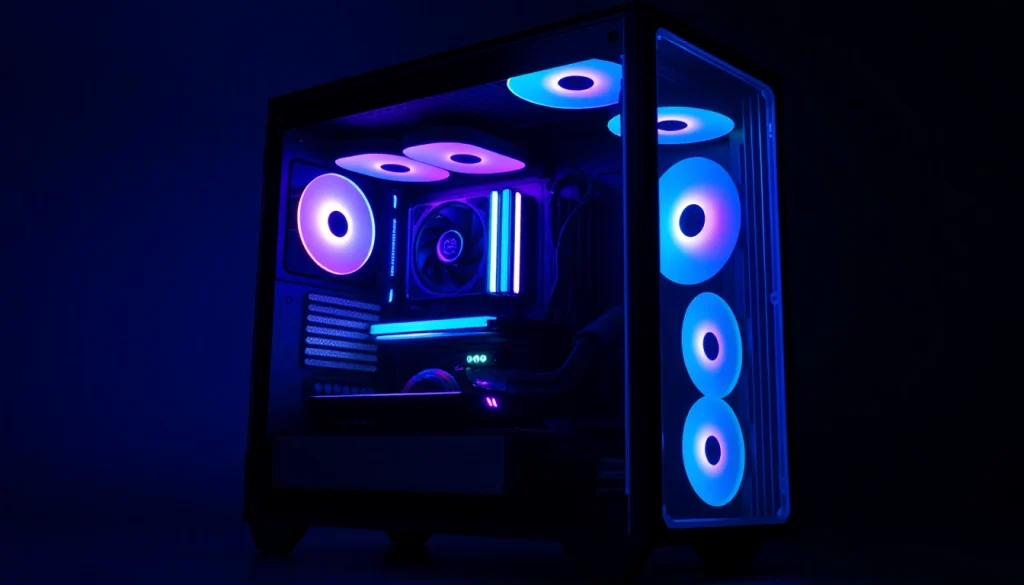Understanding Custom Gaming PC Cases
What is a Custom Gaming PC Case?
A custom gaming PC case is a meticulously designed enclosure crafted specifically for housing a computer aimed at gaming scenarios. Unlike standard cases that cater to a variety of uses, custom gaming PC cases are tailored to reflect the user’s personal aesthetics and functional needs. This customization can involve unique designs, colors, sizes, and features that enhance the overall gaming experience. Whether it’s the choice of material, style, or internal layout, custom cases empower gamers to build systems that not only perform well but also look extraordinary.
Benefits of Choosing a Custom Gaming PC Case
The decision to invest in a custom gaming PC case is often driven by a blend of aesthetics, functionality, and individuality. Below are several benefits:
- Personalization: With a custom gaming PC case, personal expression is limitless. Gamers can choose designs that resonate with their gaming style or brand affiliations, allowing for an artistic representation of their identity.
- Optimized Cooling: A bespoke design means that gamers can prioritize airflow and cooling features tailored to their specific hardware requirements, enhancing performance through effective temperature management.
- Increased Durability: Custom cases can be built with more robust materials that not only ensure longevity but also provide excellent protection for components, particularly during transport.
- Improved Aesthetics: Many gamers enjoy the visual aspect of their rigs. Custom cases often contain lighting features, color schemes, and artistic prints that can turn a standard setup into a stunning centerpiece.
- Expansive Features: Custom cases can accommodate various sizes and layouts of components (like GPUs, cooling solutions, etc.), providing versatility to upgrade in the future without limitations.
Key Features to Look For
When selecting a custom gaming PC case, certain features can greatly enhance the building and gaming experience. Here are some key features to consider:
- Size Compatibility: Ensure that the case supports the motherboard size (ATX, Micro ATX, Mini ITX) and has adequate space for additional components.
- Cooling Options: Look for cases with options for multiple fans and radiator support for liquid cooling, as well as mesh panels for optimized airflow.
- Expandability: A good case offers ample room for future upgrades such as additional drives and GPU slots.
- Cable Management: Consider cases with adequate routing options and space for organized cable management, enhancing the aesthetic while improving airflow.
- Build Quality: Evaluate the durability features of the case, as different materials can influence both aesthetics and functionality.
Factors Influencing Your Custom Gaming PC Case Design
Size and Compatibility Considerations
One of the most critical considerations when designing your custom gaming PC case is the size and compatibility with the components you intend to use. The choice of motherboard size can heavily dictate the overall dimensions of your case. Here’s how to strategically approach this aspect:
- Motherboard Size: Choose your motherboard first, as it is a core component. Options include ATX, Micro ATX, and Mini ITX, with each offering different size limitations for the case design.
- Graphics Card Length: High-performance gaming often involves larger GPUs. Ensure that the case can accommodate the chosen card’s length, particularly those built for gaming high-end experiences.
- Internal Space: Take into account space for SSDs and HDDs, as well as other peripherals such as cooling systems that may demand significant room.
Material Choices: Acrylic vs. Steel
The materials used in the construction of a custom gaming PC case can dramatically impact its aesthetic appeal and performance metrics. Here’s a deep dive into common materials:
- Acrylic: A popular choice for its lightweight properties and ability to be molded into custom shapes and designs. Acrylic cases often feature transparent sections for showcasing internal components and RGB lighting.
- Steel: Known for its durability and strength, steel provides excellent protection and stability for components. It is heavier than acrylic but more resilient, making it suitable for gamers who transport their PCs frequently.
- Aluminum: Often used in high-end cases for its lightweight and premium feel. It offers good heat dissipation and is more expensive than other materials, appealing to enthusiasts.
Ventilation and Cooling Options
Effective cooling is paramount in a gaming PC, especially during intensive gaming sessions. Here’s what to consider regarding ventilation:
- Fan Configuration: Custom cases allow you to choose how many intake and exhaust fans to include, impacting overall airflow.
- Liquid Cooling Support: If planning on liquid cooling, ensure the case supports radiators and has proper mounting options.
- Airflow Design: Look for mesh panels or strategically placed vents that facilitate unobstructed airflow within the case.
Personalizing Your Custom Gaming PC Case
Designing Custom Artwork and Prints
The unique aspect of custom gaming PC cases lies in their artistic potential. Many options exist to personalize the exterior:
- Custom Panels: Some manufacturers provide options to print or etch graphics onto panel surfaces, allowing for a bespoke look.
- Vinyl Wraps: These can be applied easily to various case surfaces. They come in numerous designs, allowing creativity without damaging the underlying material.
- Positive Messaging: Engraving personal messages or quotes onto the chassis can provide a unique touch that resonates with the user.
Incorporating RGB and LED Lighting
Lighting can transform the aesthetics of a gaming PC significantly. Here’s how to effectively incorporate RGB and LED lighting:
- RGB Fans: Select fans that come with RGB lighting for an integrated aesthetic. These fans not only contribute to cooling but also enhance the visual appeal.
- LED Strips: Routed through the inner and outer sections of the case, LED strips can highlight key areas such as the motherboard or GPU.
- Lighting Synchronization: Many modern components allow synchronized lighting effects, creating a cohesive theme that can be controlled via software.
Choosing Colors and Finishes
The right color palette can further personalize your case to match your preferences or gaming theme:
- Solid Colors: Simple solid color cases can fit a minimalist aesthetic, allowing other components like coolers or GPUs to stand out.
- Textured Finishes: Opt for finishes like matte or gloss that can give a distinctive character to the case, either absorbing or reflecting light in intriguing ways.
- Themed Colors: Some custom designs can directly tie into popular game franchises, promoting a distinct connection with beloved titles.
Popular Brands and Options for Custom Gaming PC Cases
Top Manufacturers and their Offerings
Many brands have established themselves in the gaming case market, each offering unique features and customization options. Noteworthy names in the industry include:
- NZXT: Known for sleek, modern designs with customizable RGB elements.
- HYTE: Offers aesthetically pleasing configurations that blend functionality and style.
- Fractal Design: Renowned for its minimalist aesthetic and exceptional airflow systems.
- Lian Li: Premium aluminum cases known for their craftsmanship and aesthetic appeal.
Comparing Features Across Brands
While exploring brands, it is crucial to compare feature sets such as:
- Airflow Capabilities: Evaluate how well each brand manages heat through various fan setups and design choices.
- Ease of Assembly: Some cases are designed with user-friendliness in mind, offering tool-less entry or cable management features.
- Warranty and Support: Ensure that the brand offers good after-sales support and solid warranty terms for their products.
Where to Buy or Order Custom Designs
For those interested in acquiring a custom gaming pc case, options are abundant. Customers can explore local computer shops, e-commerce platforms, and dedicated gaming hardware sites. Websites like iBUYPOWER or custom PC case retailers provide the facility for tailored builds, while platforms like Amazon may have an extensive selection of pre-existing designs and accessories.
Building and Maintaining Your Custom Gaming PC Case
Assembly Tips for Your Custom Gaming PC Case
Assembling a custom gaming PC can be an exciting process filled with opportunities to create a visually striking and functional build. To ensure a smooth assembly, consider these tips:
- Prepare All Tools: Gather all necessary tools like a screwdriver, zip ties, and thermal paste beforehand to avoid interruptions.
- Careful Handling: Handle sensitive components with care to avoid static damage. Use an ESD strap or regularly ground yourself while working.
- Follow a Step-by-Step Approach: Work through the build sequentially. Start with installing the motherboard, followed by the power supply, then the rest of the components.
Regular Maintenance and Cleaning
Maintenance is essential to ensuring the longevity and performance of your gaming PC case. Here’s how to keep it running smoothly:
- Dust Management: Regularly check and clean the interior. Dust can accumulate quickly around fans and components, impeding airflow.
- Check Connections: Periodically inspect connections and cables for wear and ensure that everything is firmly seated.
- Cooling System Check: Monitor fan and pump operations and replace components that become inefficient.
Upgrading Components Within Your Custom Case
As technology advances, so do the demands of games. Opting for a custom gaming PC case often paves the way for future upgrades. When considering upgrades:
- Plan Component Compatibility: Before purchasing new hardware, ensure it fits within your existing ecosystem, particularly in relation to size and cooling solutions.
- Stay Informed on Hardware: Keep up with new releases and check compatibility databases for the latest graphics cards and processors.
- Maintain a Balanced System: When upgrading, ensure that the entire system is balanced in terms of performance to avoid bottlenecks.


